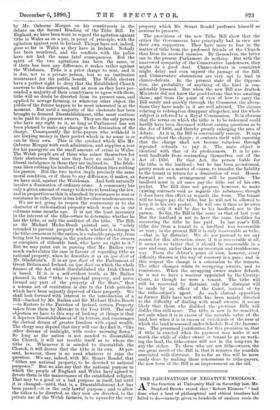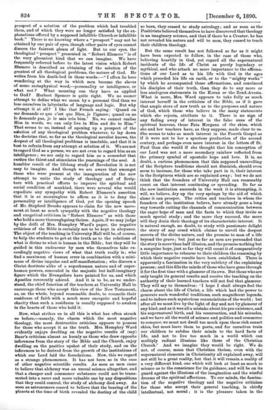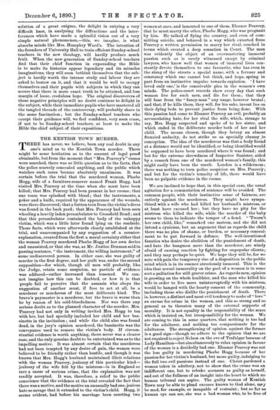THEFASCINATIONS OF NEGATIVE THEOLOGY, A 7 the function at University
Hall on Saturday last, Mr. Stopford Brooke stated that " Robert Elemere " " bad done what a host of philosophical and ethical treatises had failed to do,—namely, given to hundreds of anxious souls the prospect of a solution of the problem which had troubled them, and of which they were no longer satisfied by the ex- planations offered by a supposed infallible Church or infallible book." There is no knowing where a "prospect " may not be attained by one pair of eyes, though other pairs of eyes cannot discern the faintest gleam of light. But to our eyes, the theological " prospect" presented in " Robert Elsmere " is of the very gloomiest kind that we can imagine. We have frequently referred before to the latest vision which Robert Dismere is described as obtaining of the solution of the greatest of all theological problems, the nature of God. He writes from his death-bed in these words I often lie here wondering at the way in which men become the slaves of some metaphysical word,—personality or intelligence, or what not P What meaning can they have as applied to God P Herbert Spencer is quite right. We no sooner attempt to define what we mean by a personal God than we lose ourselves in labyrinths of language and logic. But why attempt it at all P I like that French saying : Quand on me demande ce que c'est que Dien, je ''ignore; quand on ne le demande pm, je le sale tres bien.' No, we cannot realise Hint in words, we can only live in Him and die to Him." That seems to us, instead of opening up a prospect of the solution of any theological problem whatever, to lay down the doctrine that, so far as the theological novelist knows, the deepest of all theological problems is insoluble, and that it is best to refrain from any attempt at solution of it. We are not tC regard God as a person, we are not even to regard him as an intelligence ; we are only to regard him as a somewhat that excites the thirst and stimulates the yearnings of the soul. A humbler result of the lifelong study of Revelation it is not easy to imagine. And though we are aware that amongst those who were present at the inauguration of the new attempt to unite the study of theology and of Scrip- ture with practical efforts to improve the spiritual and social condition of mankind, there were several who would repudiate any sympathy with Robert Elsmere's assertion that it is as meaningless to affirm as it is to deny the personality or intelligence of God, yet the opening speech of Mr. Stopford Brooke appears to claim for the new move- ment at least as much sympathy with the negative theology and exegetical criticism in "Robert Elsmere " as with those who hold a more thoroughgoing theism. Again, if we may judge by the drift of Mrs. Humphry Ward's paper, the negative criticism of the Bible is certainly not to be kept in abeyance. The object of the teaching in University Hall will be, of course, to help the students to get at the truth as to the relations of what is divine to what is human in the Bible ; but they will be guided in- this endeavour by men who themselves take ex- ceedingly negative views of what that truth really is ; who find a maximum of human error in combination with a mini- mum of divine impulse and self-manifestation; who discern a Christ destitute alike of a superhuman nature and of super- human powers, concealed in the majestic but half-imaginary figure which the Evangelists have painted for us, and which Apostles reverently adored. And it is to be, as we under- stand, the chief function of the teachers at University Hall to encourage those who accept this view of the New Testament, as, on the whole, beyond reasonable doubt, to reconcile their residuum of faith with a much more energetic and hopeful charity than such a residuum is usually supposed to awaken in the hearts of those who hold it.
Now, what strikes us in all this is what has often struck us before,---namely, the charm which the most negative theology, the most destructive criticism appears to possess for those who accept it as the truth. Mrs. Humphry Ward evidently enjoys dwelling on the negative results of (say) Baur's criticism almost as keenly as those who draw opposite inferences from the story of the Bible and the Church, enjoy dwelling on the positive upshot of their study, and on the inferences to be derived from the growth of the institutions of which our Lord laid the foundations. Now, this we regard as a strange phenomenon. It has not been so in the case of other negative scientific results. As soon as men came to believe that alchemy was an unreal science altogether, and that a cheaper and commoner substance could not be trans- muted into a rarer and more valuable one by any dispositions that they could control, the study of alchemy died away. As soon as astronomers ceased to believe that the bearing of the planets at the time of birth revealed the destiny of the child so born, they ceased to study astrology ; and as soon as the Positivists believed themselves to have discovered that theology is an imaginary science, and that if there be a Creator, he has not revealed his nature and will to men, they ceased to teach their children theology.
But the same result has not followed so far as it might have been expected to follow, in the case of those who, believing heartily in God, yet regard all the supernatural incidents of the life of Christ as purely legendary. or mythical, and who attach no more importance to the affirma- tions of our Lord as to his life with God in the ages which preceded his life on earth, or to the "mighty works" by which he accompanied those affirmations, and convinced his disciples of their truth, than they do to any more or less analogous statements in the Koran or the Zend-Avesta. What is more, Mrs. Ward appears to take fully as much interest herself in the criticism of the Bible, as if it gave that ample store of new truth as to the purposes and nature of God, which those who believe in the many statements which she rejects, attribute to it. There is no sign of any fading away of interest in the false suns of the spiritual heavens, those Foto. Morgana of the skies, which she and her teachers have, as they suppose, made clear to us. She seems to take as much interest in the Fourth Gospel as if it were not to her a spurious production of the second century, and perhaps even more interest in the letters df St. Paul than she would if she thought that his conception of our Lord was not a mere secondary rainbow reflected from the primary symbol of apostolic hope and love. It is, no doubt, a curious phenomenon that this supposed unravelling of the Scripture traditions should not diminish, should even seem to increase, for those who take part in it, their interest in the Scriptures which are so explained away ; but we do not think that the founders of University Hall can reasonably count on that interest continuing or spreading. So far as the new institution succeeds in the work it is attempting, it will, we believe, dry up the very springs by the aid of which alone it can prosper. The critics and teachers in whom the founders of the institution believe, have already gone a long way towards cutting the channels of communication between the eager hope of man and the facts to which they invite so much special study ; and the more they succeed, the more will they drain their theology of its characteristic interest. It is natural enough, no doubt, to study with passionate delight the story of any creed which claims to unveil the deepest secrets of the divine nature, and the promise to man of a life beyond the grave ; but just so far as men are persuaded that the story is more than half illusion, and the promise nothing but a sanguine hope, just so far they will count it of comparatively little importance to rehearse to their children the reasoning by which their negative results have been established. There is apparently a fascination in the very subtlety of the explaining process ; and this fills the minds of those who have gone through it for the first time with a glamour of its own. But those who are only taught its general results and receive the teaching on the authority of their learned teachers will not feel that glamour. They will say to themselves : I hope I shall always feel the charm about the life of Christ, a life which had the power to generate such wonderful traditions, such magnificent legends, and to induce such mysterious renunciations of the world ; but after all we must live by the light of day and not by glamour of any kind, and as it was all a mistake about his pre-existence, and his supernatural birth, and his resurrection, and his miracles, and we have all the world of science and politics and commerce to conquer, we must not dwell too much upon these rich sunset skies, but must leave them to poets, and for ourselves train our children to subdue their minds to the hard facts of life, and not to live too much in a world which can multiply radiant illusions like those of the Christian Church.' And we imagine they would be right. We do not, of course, mean that Christian theism, even with the supernatural elements in Christianity all explained away, will not still be a great reality, but that it will remain a reality of a very different kind, one which will look at least as much to science as to the conscience for its guidance, and will be on its guard against the illusions of the imagination and the wistful dreams of the spiritual affections. To our minds, the fascina- tion of the negative theology and the negative criticism for those who accept their general teaching, is chiefly intellectual, not moral ; it is the pleasure taken in the
solution of a great enigma, the delight in untying a very difficult knot, in analysing the diffractions and the inter- ferences which have made a. splendid vision out of a very simple natural phenomenon,—this, we imagine, is what absorbs minds like Mrs. Humphry Ward's. The intention of the founders of University Hall to train efficient Sunday-school teachers in the new theology, will hardly produce much fruit. When the new generation of Sunday-school teachers find that their chief function in expounding the Bible 'is to make its histories appear legendary and its miracles imaginations, they will soon bethink themselves that the sub- ject is hardly worth the intense study and labour they are asked to bestow on it, and that it would be well to occupy themselves and their pupils with subjects in which they can secure that there is more exact truth to be attained, and less anargin of loose, credulous hope. The original discoverers of these negative principles will no doubt continue to delight in the subject, while their immediate pupils who have mastered all the tangled threads of the controversy, will probably share in the same fascination ; but the Sunday-school teachers who accept their guidance will, we feel confident, very soon cease, if not to be Sunday-school teachers, at least to make the Bible the chief subject of their expositions.
























































 Previous page
Previous page